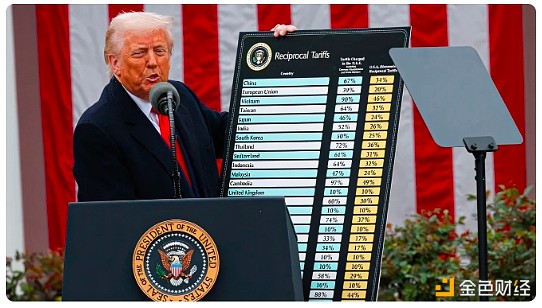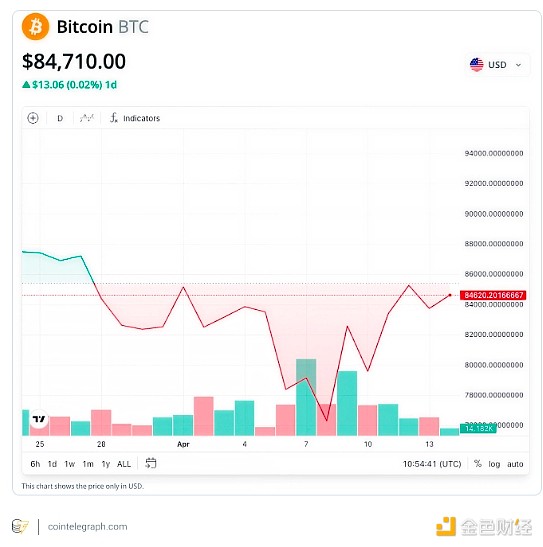Source: CoinTelegraph; Compiled by: Baishui, Golden Finance
1. As trade tensions intensify, Bitcoin joins the safe-haven debate
For decades, whenever a crisis hits, investors have flocked to gold and U.S. Treasuries, but in today's digital, decentralized world, Bitcoin is beginning to become a safe-haven asset. Despite its volatility, Bitcoin has shown resilience during periods of global turmoil, including trade wars, which has prompted people to re-examine its role as a store of value.
Let's take a look back to understand the origin of this question.
For decades, whenever uncertainty (whether war, inflation or sudden political changes) disrupts the global economy, investors will do what they usually do - flee to the safest hills. Historically, these hills have been made of gold or filled with U.S. Treasuries. But things are changing.
In a world that is more digital, decentralized and turbulent than ever before, people are beginning to wonder whether Bitcoin could be part of the modern safe-haven asset, especially during disruptive events such as trade wars.
To understand this question, you need to first explore what makes an asset a safe haven, how Bitcoin has performed during recent trade-related turmoil, and whether it has earned its place alongside more traditional defensive assets.
First, the concept of a “safe haven asset” is not about profit, but about preservation of value. In times of crisis, investors want assets that can withstand stress. Gold has held that status for decades. The U.S. dollar, while a fiat currency, is often viewed as a safe haven due to its global reserve currency status and the strength of U.S. financial institutions.
U.S. Treasuries are backed by the full faith and credit of the U.S. government. All of these assets should have relatively low volatility and high liquidity.
Now, here’s the thing: Bitcoin’s volatility is not low. It’s known for its wild swings. But despite this, you may have seen moments when it behaved like a safe haven. Not always, but sometimes it does, and that’s interesting.
Isn’t it?
2018-19 Trade War and Bitcoin’s Role in Turbulent Times
During the 2018-2019 China-U.S. trade war, Bitcoin soared as traditional markets roiled, hinting at its potential as a hedge in turbulent times. Despite the growing attention given to its image as “digital gold,” Bitcoin’s movements often mirror those of speculative tech stocks, and its safe-haven status remains unproven.
Take the 2018-2019 China-U.S. trade war as an example. Global markets became increasingly volatile as tariff threats escalated and tensions between the two economic giants increased. Tech stocks took a beating, and commodity prices also fluctuated. Yet, amid all this, a strange thing happened. Bitcoin quietly soared. From April to July 2019, the price of Bitcoin climbed from about $5,000 to over $12,000.
Bitcoin was not alone. Gold prices also rose during this period. Yet it was one of the earliest signs that Bitcoin might be more than just a risk-on asset, and could also serve as a hedge in times of turmoil. That period gave rise to a new narrative: Bitcoin is “digital gold.”
The fixed supply of 21 million coins gives it scarcity. Its decentralized nature means it’s not subject to the policies of any single government. And, because it’s built on a global, censorship-resistant network, it’s immune to capital controls common in times of financial stress. These qualities began to resonate with investors seeking alternatives to traditional safe havens.
To be fair, Bitcoin hasn’t always followed the same path. While it has sometimes moved in the opposite direction of risk assets, more often than not, it has behaved more like a speculative tech stock, especially in the short term. Historically, Bitcoin has had a strong correlation with the Nasdaq. So while the “digital gold” narrative has gained steam, it still aligns with the idea that Bitcoin is a high-beta investment for risk-seeking investors.
III. Insider of Trump’s tariff war in 2025: Market turmoil, Bitcoin rises
In early 2025, Trump’s sweeping tariffs sparked panic in financial markets, with the Nasdaq and S&P experiencing historic declines. In two days, trillions of dollars evaporated from U.S. stock indices, reigniting the debate over Bitcoin as a modern safe haven.
Fast forward to April 2025, the question of whether Bitcoin can be a safe haven is once again put to the test. This time, the test is more pronounced. In February 2025, Trump, already in his second term, announced a new round of aggressive tariffs aimed at revitalizing the U.S. manufacturing industry.

Such headlines instantly alarmed financial markets, especially as major trading partners began to privately discuss retaliation. On April 2, Trump announced what he called "Liberation Day," imposing comprehensive tariffs on almost all imported goods. This was labeled as economic patriotism, but for the market, it meant chaos.
The chaos came quickly. On April 3, the Nasdaq Composite Index plunged nearly 6%, a single-day drop of more than 1,000 points. In terms of raw data, this was a record drop. The S&P 500 did not perform much better, falling nearly 5%. Investors began to panic about supply chain disruptions, inflationary pressures, and a possible global economic slowdown.
On April 4, panic deepened. The Nasdaq officially entered bear market territory, and the Dow Jones fell more than 2,200 points in a single day. In 48 hours, the market value of major U.S. stock indices evaporated trillions of dollars.
Fourth, Bitcoin did not surge during the market crash, but it did not fall either
During the market crash in April 2025, Bitcoin remained stable as the stock market plummeted, and its resilience surprised many. It did not surge, but its stability in the chaos hinted at its growing role as a store of value in turbulent times.
So, how did Bitcoin perform? Surprisingly, it did not change catastrophically, and that is the truth of the story. During the tariff-induced sell-off, almost all other currencies plummeted, but Bitcoin did not collapse. This alone is remarkable.

In a market where even the most established benchmarks have collapsed, Bitcoin’s relative stability has attracted the attention of portfolio managers and institutional observers.
Long criticized for being too volatile to be a serious portfolio, Bitcoin has quietly weathered the storm better than many traditional assets. This is not a "moonshot" but a moment of resilience. It is more about value preservation than value appreciation. And this is exactly what investors seek safe havens in the first place. As the Nasdaq and S&P plummeted, Bitcoin has continued to hold its ground, which reinforces the view that Bitcoin may be evolving into a more stable asset.
To be clear, Bitcoin has not completely departed from risk assets. It is still subject to liquidity, monetary policy, and investor sentiment. But in periods like April 2025, it exhibits some different qualities. Instead of crashing, it holds up! And for more and more investors, this is becoming increasingly important.
V. Bitcoin is not the new gold, but it is not the old BTC either
Bitcoin's growing resilience stems from its maturing market, growing institutional adoption, and its appeal as a non-sovereign, transferable hedge in times of financial or geopolitical stress. While it is not yet the ultimate safe haven, it has clearly transcended its speculative roots and is earning a place.
Part of this growing momentum stems from structural factors. Over the past few years, the Bitcoin market has matured. Institutional adoption has increased. Spot Bitcoin ETFs are now available on major markets. Custody solutions are also more sophisticated. Perhaps most importantly, there is a broader understanding of what Bitcoin means.
Bitcoin is no longer just a speculative currency. It is a tool for maintaining financial sovereignty, hedging against fiat currency debasement, and pushing the boundaries of politicized financial infrastructure.
In addition, Bitcoin is completely non-sovereign. In the context of a trade war, where fiat currencies can be weaponized and capital controls will be deployed, Bitcoin is extremely attractive to those who want to move money across borders without interference. It is portable, permissionless, and increasingly liquid. These three qualities are exactly the assets people crave in times of crisis.
Of course, this does not mean that Bitcoin is now the undisputed king of safe-haven assets. For most conservative investors around the world, gold still plays this role. The US dollar is still the default choice when people seek liquidity in a crisis. Bitcoin's price volatility can still make people nervous. But you will see it gradually mature in market chaos. It is no longer as marginalized as before.
Six, Bitcoin in times of crisis, safe haven 2.0?
In both 2019 and 2025, Bitcoin showed flashes of safe-haven behavior, proving that it can serve as a hedge tool in times of geopolitical tension. While it’s not gold yet, its unique attributes make it an increasingly important player in the global financial landscape.
Whether it’s during the trade tensions of 2019 or the tariff escalation of 2025, Bitcoin has behaved more like a hedge than in previous cycles. That’s worth watching. Even if Bitcoin hasn’t yet played a consistent role as a safe haven, it’s starting to show its ability to do so, at least in specific circumstances.
There’s a bigger question brewing here, too. If Bitcoin does become a mainstream safe-haven asset, what does that mean for financial markets? How would that change portfolio construction, risk models, and even geopolitical strategy? Bitcoin is not gold, after all. It plays by completely different rules.
Bitcoin is programmable. It can be transferred around the world instantly. It can be divided into satoshis and embedded in smart contracts. If it becomes one of the tools for the global response to a crisis, the rules of the game will change.
So, is Bitcoin the new safe haven during trade wars? Not really, at least not in the traditional sense. But it has certainly earned its place.
Bitcoin may not be the asset your grandparents bought to protect themselves during uncertain times, but it is becoming a safe haven for more and more investors, especially in the digital age. As geopolitical tensions rise and confidence in the traditional financial system declines, Bitcoin is positioning itself as a potential hedge for the future.
 Davin
Davin
 Davin
Davin Jixu
Jixu Aaron
Aaron Jixu
Jixu Jasper
Jasper Jixu
Jixu Joy
Joy Hui Xin
Hui Xin Aaron
Aaron Davin
Davin